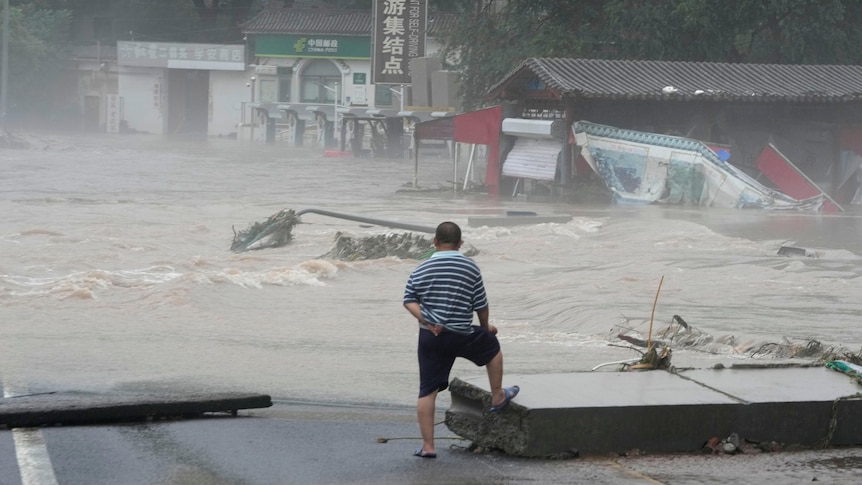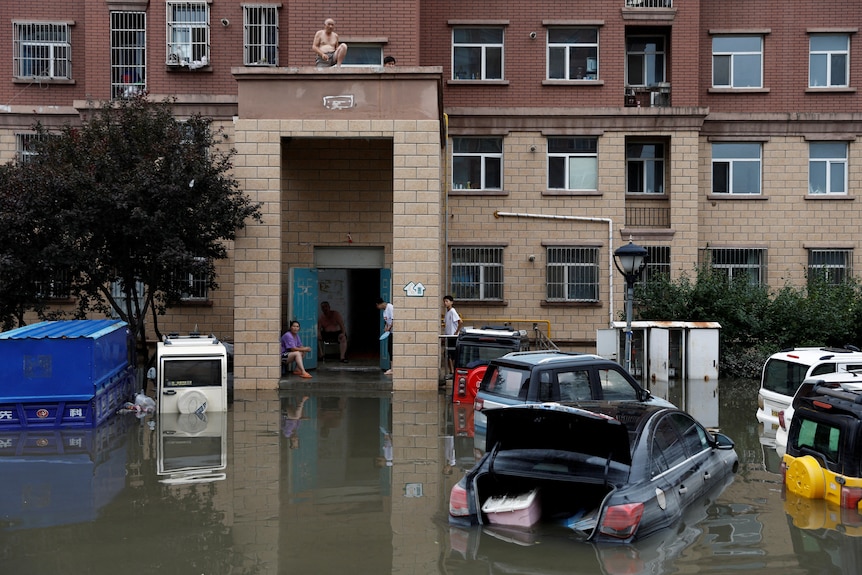By Jenny Cai with wires

China is suffering heavy economic loss from recent natural disasters due to severe weather.
(AP: Ng Han Guan)
A magnitude 5.5 earthquake has struck eastern China as rain continued to pelt the north-eastern regions in the wake of Typhoon Doksuri, adding more pressure to the country's struggle to recover its economy from the COVID pandemic.
Key points:Analysis shows Chinese provinces occupy more than half of global top 50 list of states and provinces most at risk of climate-related disaster by 2050
A magnitude 5.5 earthquake struck eastern China as flooding continues in the north-eastern regions
The impact of floods, while common in China in summer, has grown more pronounced this year
China's direct economic losses from natural disasters surged to 41.18 billion yuan ($8.72billion) in July, more than in January to June combined.
The impact of floods, while common in China in summer, has grown more pronounced this year, affecting over 7 million people nationwide in July, when Beijing was struck by the worst rains in 140 years.
Meanwhile, scorching summer heat and drought are threatening crops in other regions after the capital's hottest June on record.
August, when rainfall usually peaks and temperatures soar, is set for further economic impact from floods and heatwaves.
Rainfall in north-eastern provinces could be as much as 50 per cent higher than normal in August, China's national forecaster have warned.
Shi Heling, an economic professor at Monash University, said impact of recent natural disasters had dealt a "huge blow" to China's economy.
Professor Shi Heling said recent natural disasters had significant negative impacts on China's economy recovery from the pandemic. (Supplied)
"China's governments at all levels are already running in deficits due to costs during the three years of COVID-zero policies that used up the governments' savings."
"The floods happened at the North China Plain, where there are lots of farmlands. The crops were submerged by the floods and will lead to shortage of many products."
"The disasters happened at a really bad timing. China's economy is going downwards currently, and natural disasters would have huge impacts on people's lives."
The economic losses posed an unexpected drag on quarterly growth in the world's second-largest economy, which is already in want of stimulus as Chinese officials just rolled out a series of policy measures in recent weeks to support the economy as its post-pandemic recovery falters.
Professor Shi said the authorities were also ill-prepared to deal with the flood and subsequent impacts, as the North China Plain were rarely hit by floods before.
Why China's economy isn't recovering fast enough
Australia is relying on its largest trading partner to bounce back, but China's youth unemployment figures and low consumer confidence are slowing down much-needed growth, suggesting a full recovery will take some time.
"Most floods usually hit the southern regions near the Yellow River and Chang Jiang River ... so another reason that the damages were so huge this time was that the local officials didn't know how to respond [to the floods]," he said.
Professor Shi added that the floods may also pose a negative impact on Australia's economy, which heavily relies on exports to China, its largest trading partner.
"Many Chinese consumers may not have the abilities to consume the imported products from Australia anymore.
"China imports a lot of iron ore from Australia for building infrastructure, the government may not be able to invest as much in infrastructure if the finance is tight," Professor Shi said.
July losses from Typhoon Talim, which landed in southern China in the middle of the month, were 2.61 billion yuan ($600 million), the Ministry of Emergency Management said in a statement late on Friday.
Losses from the more destructive Doksuri reached $3.15 billion as of the end of July, the ministry said.
According to an analysis by Sydney based research firm XDI, Chinese provinces occupy more than half of global top 50 list of states and provinces most at risk of climate-related disaster by 2050.
Two of China's largest economic powerhouses, Jiangsu and Shandong, would be the most vulnerable places in the world to climate risks, according to the research.
YOUTUBEchina economy video
Earthquake hits eastern China as flood continues
Twenty-one people were injured and 126 buildings collapsed after an earthquake of magnitude 5.5 struck the eastern Chinese province of Shandong on Sunday, state broadcaster CCTV reported.
The earthquake, 10km deep, jolted Pingyuan County of Dezhou City at 02:33am local time, according to the China Earthquake Networks Centre.
China Railway Group suspended some train operations on routes including the Beijing-Shanghai Railway and Beijing-Kowloon Railway in response to the earthquake, CCTV reported.
People gather on a street in Liaocheng, China's eastern Shandong province following an earthquake. (AFP/STR)
TV broadcasters showed Dezhou residents who ran outdoors after the quake sitting on sidewalks in the pre-dawn darkness. Video on social media showed bricks that had fallen from cracked walls.
Dezhou and the surrounding area administered by the city have about 5.6 million people, according to the city government website.
Authorities in northeastern China raised their emergency response level on Sunday as tributaries of the Songhua, a major river, rose to dangerous levels after days of heavy rain caused by Typhoon Doksuri
.
People stay on a roof at a flooded residential compound after the rains and floods brought by remnants of Typhoon Doksuri, in Zhuozhou, Hebei province.(Reuters: Tingshu Wang)
China's Ministry of Water Resources said it raised the response for flooding to Level III at 10am local time in Inner Mongolia, Jilin and Heilongjiang.
China uses a four-tier emergency response system, with Level I the most urgent.
Heilongjiang, known as China's "great northern granary", is among the latest areas to suffer the aftermath of Doksuri, which has killed at least 20 people, displaced thousands and flooded Beijing and several other cities since it made landfall in the south a week ago.
China on Sunday allocated an additional 350 million yuan ($74.13 million) to support rescues and house repairs in the flood-hit regions including Beijing, Tianjin, Hebei, Heilongjiang and Jilin, according to a government statement.
The government had previously allocated $36 million for rescue and recovery work.
WATCH
Duration: 1 minute 33 seconds

People stay on a roof at a flooded residential compound after the rains and floods brought by remnants of Typhoon Doksuri, in Zhuozhou, Hebei province.(Reuters: Tingshu Wang)
China's Ministry of Water Resources said it raised the response for flooding to Level III at 10am local time in Inner Mongolia, Jilin and Heilongjiang.
China uses a four-tier emergency response system, with Level I the most urgent.
Heilongjiang, known as China's "great northern granary", is among the latest areas to suffer the aftermath of Doksuri, which has killed at least 20 people, displaced thousands and flooded Beijing and several other cities since it made landfall in the south a week ago.
China on Sunday allocated an additional 350 million yuan ($74.13 million) to support rescues and house repairs in the flood-hit regions including Beijing, Tianjin, Hebei, Heilongjiang and Jilin, according to a government statement.
The government had previously allocated $36 million for rescue and recovery work.
WATCH
Duration: 1 minute 33 seconds
Extreme flooding leaves at least 20 people dead in China
ABC/wires
ABC/wires
No comments:
Post a Comment